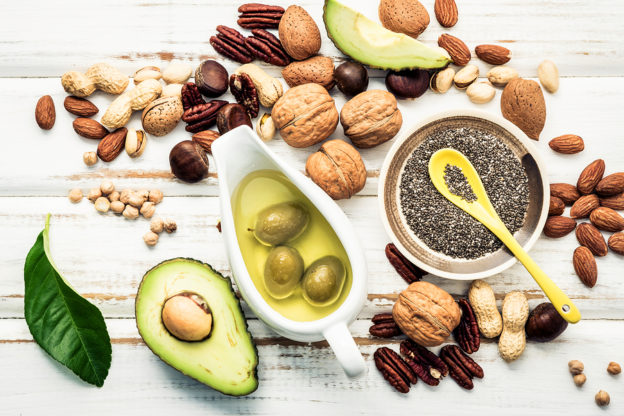By David Blyweiss, M.D., Advanced Natural Wellness
October 19, 2018
- Why everyone should be a “fathead”
- What can eating more fat do for your health?
- It’s time to put these “forbidden” foods back on your menu
When I was a kid, calling someone a “fathead” was an enormous insult. It was the equivalent of calling somebody dim-witted or stupid, but with a little added sting to it. That sort of name-calling could quickly turn into a physical altercation.
Well, that was then. Call me a fathead today and all you’ll get from me is a great big “thank you”.
You see, about 60% of your brain is composed of fats. It needs fats to function properly and help you maintain cognitive function as you age. Certain fats can even help your brain work less hard while actually boosting your mental performance.
But your brain isn’t the only thing that needs healthy fats to thrive.
Your body can’t absorb fat-soluble vitamins like A, D, E and K without fats. They are absolutely necessary for brain function, hormone production, energy levels and the health of your skin, bones and eyes.
Open your arteries, improve blood flow for a new health miracle...
Did you know your circulatory system has over 60,000 miles of arteries, veins and other blood vessels, if stretched end to end?
But as you age, your blood vessels undergo changes, which may cause them to stiffen, thicken and get clogged.
GOOD NEWS! Doctors have now identified a “Miracle Molecule” inside your arteries that helps OPEN your arteries and IMPROVE blood flow.
It’s what Dr. Valentin Fuster calls it, "One of the most important discoveries in the history of cardiovascular medicine."To you, that means...
- Healthy blood pressure
- Sharper mind and memory
- Skyrocketing energy and muscular strength
- Increased pleasure and passion in the bedroom
- Improved circulation to every cell and organ in your body
Go here to discover a new natural way to significantly boost the levels of this miracle molecule in YOUR body NOW!
And despite years of misconception, fatty foods aren’t the “enemy” when it comes to a healthy heart and weight maintenance. Quite the opposite, in fact. Eating the right fats is extremely heart healthy… and can actually help prevent the distribution of fat to your belly.
So let’s get rid of that myth here and now… and zero in on some deliciously healthy and fatty foods that should be a regular part of your diet.
Here’s What Eating More Fat Can do For You
An avocado a day keeps the fat away. One of my favorite fatty foods is avocados. I eat them whole, slice them into salads, use them for guacamole and frequently add them as a garnish to eggs and other foods. I’ve also had avocado brownies with walnuts which were tastier and richer than regular brownies. But if the rich, creamy flavor of avocados isn’t enough to get you excited, I’ll share three great reasons for eating more avocados.
- Eating just half of an avocado with your lunch can improve insulin response and lower your blood sugar. These are two of the biggest factors when it comes to storing – or not storing – fat.
- The monounsaturated fats in avocadoes have an influence on the hormone that tells you you’re full. It works so well that, after eating just half of an avocado, it can reduce your desire to eat by about 40% over the next three to five hours.
- Eating a single avocado daily reduces your burden of small dense LDL particles. These are the ones that tend to slip through the lining of your blood vessels where they create blockages that can result in heart attack or stroke.
Omega-3s to slash brain aging. Another food you should eat every day is omega-3 rich wild-caught fish. In fact, getting more omega-3s in your diet is probably the #1 thing you can do for both your brain and your body.
These fatty acids tackle all four of the key reasons your brain ages!
They reduce brain shrinkage, strengthen neuron communication, increase blood flow to the brain and help reduce levels of beta amyloid. All these events are associated with better memory and brain performance, while reducing risk of mental decline and dementia.
Are You Suffering From...
- Love handles and a pot belly
- Romance that isn't what it used to
- Forgetfulness and inattention
- Low (or no) strength and endurance
- A sex drive that's shifted into neutral...or worse
If so...you may have Mature Male Burnout. Click here to discover more about this unique condition and what you can do about it.
As if that’s not enough, omega-3 fatty acids, particularly eicosapentaenoic acid, naturally reduce both small, dense LDL particles and levels of inflammatory C-reactive protein (CRP) levels. So they are extremely heart healthy.
Extra virgin olive oil is the only kind I use. It contains an incredible antioxidant called oleocanthal. This compound boosts production of proteins and enzymes that are critical in removing brain-numbing beta-amyloid and tau from your brain.
Olive oil is also great at slashing inflammation, reducing your chances of a stroke or heart attack, protecting against diabetes and countering obesity. Google “authentic olive oils” to see which ones are unadulterated and pure.
Eggs aren’t your enemy. For years people thought eggs were unhealthy because of their high fat and cholesterol content. But today we know that eating a pastured egg each day may actually lower risk of stroke and heart problems. And they have an extremely healthy effect on those dangerous, small and dense LDL particles.
Additionally, eggs are also rich in choline, which is needed to produce acetylcholine in your brain. This neurotransmitter affects mood, brain function, memory and motor control. (If you have reduced levels of acetylcholine, it greatly increases your chances of dementia.)
The extremely healthy side of nuts. Tree nuts like Brazil nuts, walnuts, pecans and pistachios can have a profound effect on your endothelial function, blood pressure, and homocysteine levels. These are three very important factors in maintaining a healthy cardiovascular system and protecting against heart disease.
They also protect against the development of type 2 diabetes and boost brain function. Plus, people who enjoy nuts regularly tend to have lower body mass and greater weight loss than those who don’t eat them.
SOURCES:
Paniagua JA, et al. Monounsaturated fat-rich diet prevents central body fat distribution and decreases postprandial adiponectin expression induced by a carbohydrate-rich diet in insulin-resistant subjects. Diabetes Care. 2007 Jul;30(7):1717-23.
Wien M, et al. A randomized 3×3 crossover study to evaluate the effect of Hass avocado intake on post-ingestive satiety, glucose and insulin levels, and subsequent energy intake in overweight adults. Nutr J. 2013 Nov 27;12:155.
Li Wang, et al. Effect of a Moderate Fat Diet With and Without Avocados on Lipoprotein Particle Number, Size and Subclasses in Overweight and Obese Adults: A Randomized, Controlled Trial. J Am Heart Assoc. 2015;4:e001355
Alexander DD, et al. Meta-analysis of Egg Consumption and Risk of Coronary Heart Disease and Stroke. J Am Coll Nutr. 2016 Nov-Dec;35(8):704-716.
Poly C, et al. The relation of dietary choline to cognitive performance and white-matter hyperintensity in the Framingham Offspring Cohort. Am J Clin Nutr. 2011 Dec; 94(6): 1584–1591.
Pottala JV, et al. “Higher RBC EPA + DHA corresponds with larger total brain and hippocampal volumes: WHIMS-MRI study.” Neurology. 2014 Feb 4;82(5):435-42.
Fernando Gómez-Pinilla. “Brain foods: the effects of nutrients on brain function.” Nat Rev Neurosci. Jul 2008; 9(7): 568–578.
Jackson PA, et al. “DHA-rich oil modulates the cerebral haemodynamic response to cognitive tasks in healthy young adults: a near IR spectroscopy pilot study.” Br J Nutr. 2012 Apr;107(8):1093-8.
Angeloni C, et al. Bioactivity of Olive Oil Phenols in Neuroprotection. Int J Mol Sci. 2017 Nov; 18(11): 2230.
Afshin A, et al. Consumption of nuts and legumes and risk of incident ischemic heart disease, stroke, and diabetes: a systematic review and meta-analysis. Am J Clin Nutr. 2014 Jul;100(1):278-88.







